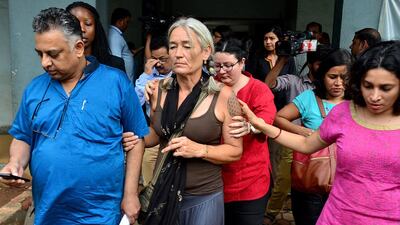PANAJI, GOA // Two Indian men were acquitted on Friday of the culpable homicide and rape of a British teenager in Goa eight years ago, a case that raised questions about police negligence and the safety of tourists in the coastal resort.
Samson D’Souza and Placido Carvalho were accused of drugging and sexually abusing Scarlett Keeling, 15, after a party, leaving her to die in shallow seawater,
The police originally said Scarlett had drowned after taking drugs but changed their story after her mother complained, and a second autopsy concluded she had been raped and murdered.
Scarlett’s mother, Fiona MacKeown, looked shaken as judge Vandana Tendulkar declared, “I find them not guilty of all charges,” to the packed courtroom amid cheers from friends and relatives of the accused.
The hearing lasted less than a minute.
As she emerged from the court in the state capital, Panaji, Ms MacKeown promised she would fight to overturn the verdict.
“I am reeling. It’s been eight years of agony. I feel devastated and will definitely be challenging the verdict,” she said. “We had been waiting all this time and it’s just rubbish. India’s whole judicial system has totally let me down. “Somebody murdered my daughter in this country and somebody must be held accountable.”
Goa state’s top elected official, Laxmikant Parsekar, said prosecutors would study the judgment. “We should go for an appeal,” he said.
Ms MacKeown has repeatedly accused the police of covering up the real circumstances of Scarlett’s death, and her lawyer Vikram Varma said the beachside shack where she was drugged before being raped had been pulled down. The teenager’s organs were not preserved properly and the police delayed in asking for tests, thereby damaging crucial evidence. The second autopsy showed that Scarlett had suffered more than 50 injuries to her body.
Indian media said at the time that there may have been an initial attempt by police to play down the death to protect Goa’s tourism industry.
The pristine beaches and laid-back lifestyle of the former Portuguese colony have lured foreign backpackers and tourists for decades, but Scarlett’s death threw an uncomfortable spotlight on the easy availability of drugs and the risks to women travelling in India. The case even inspired a controversial Bollywood film.
The trial began in 2010 but was dogged by numerous delays, including hearings of just one afternoon a month due to a backlog of cases and a public prosecutor withdrawing from proceedings.
The prosecution’s case also suffered a blow when a key witness, Briton Michael Mannion, known as Masala Mike, refused to testify.
Scarlett’s upbringing and her mother’s style of parenting also came under scrutiny. Scarlett had been on a six-month holiday in India with her mother, her mother’s boyfriend, and her six siblings and half-siblings. When the family, from Bideford in south-west England, decamped to the neighbouring southern state of Karnataka, Scarlett stayed on in the hippy beach town of Anjuna where she was to help local tour guide Julio Lobo, 25 with the boating trips he ran and would live in his aunt’s house. In early February, 2008, Scarlett rejoined her family in Gokarna, further down the west coast, but begged to be allowed to return briefly to Anjuna so she could attend a Valentine’s Day party. After refusing initially, Ms McKeown relented.
“Of course I will regret that as long as live,” she said later
On the night of February 17, several witnesses saw Scarlett stumbling into an Anjuna beach bar called Luis’Shack at about 3am. The bar owner said she had been drinking and was looking for a lift home. Instead she ended up in the kitchen of the bar with the two accused men. Her semi-naked body was found on the morning of February 18, 2008. After an autopsy carried out that day police inspector Nerlon Albuquerque announced Scarlett had died by accidental drowning. However, Dr Ilvano Sapeco, the veteran pathologist who did the autopsy later said he raised the possibility of “homicidal drowning” but had been ignored and overruled by the police. P
It was Scarlett’s grieving mother who found the girl’s bikini bottoms, torn sandals and shots lying unnoticed on the beach, prompting her to demand to view her daughter’s body. Amid growing media attention, the case became a criminal investigation in March, 2008.
The prosecution alleged that Samson D’Souza and Placido Carvalho, plied Scarlett with a cocktail of drink and illegal drugs, including cocaine, before sexually assaulting her and leaving her to die by dumping her unconscious in shallow water where she drowned.
They denied all the charges, claiming that the teenager died an accidental death after taking drugs of her own volition.
* Agencies

